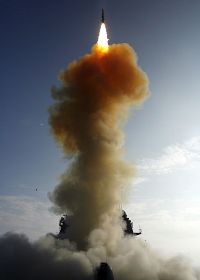
 |
| The modified SM-3 missile was launched from the USS Lake Erie to intercept the crippled satellite |
The United States Navy has successfully destroyed a crippled spy satellite in a decaying orbit, by intercepting it with a missile. A modified SM-3 missile was launched from the USS Lake Erie at 03:26 GMT this morning, and intercepted the USA-193 satellite around three minutes later. It has been reported that the satellite has broken into around 80 pieces, some of which have already re-entered the Earth’s atmosphere. The SM-3 missile was designed to shoot down other missiles, however for this launch, it was modified to act as an Anti-satellite weapon (ASAT). This was the first time the US military had used an ASAT since 1985. China, however, destroyed an old orbiting satellite on January 11, 2007.
The satellite, which was known by the designations USA-193 and NRO L-21, was launched in December 2006, by a Delta II rocket. It was believed to have been a new type of spy satellite, however it was reported to have failed within hours of launch. This resulted in it being stranded in a decaying orbit, with a full tank of potentially toxic hydrazine propellant. The officially stated purpose of destroying the satellite it to prevent possible contamination from the hydrazine, and protect public safety should it land in a populated area. Claims that the destruction was politically motivated — to demonstrate to China, who tested an anti-satellite weapon last year — or to ensure that the satellite’s classified technology did not survive re-entry and land in a hostile country, have been denied by officials. Officials believe the hydrazine tank has been destroyed, however it will take about a day to confirm this.
The Chinese government, who recieved criticism from the US government for shooting down one of their own satellites last year, have claimed the satellite’s destruction represents “possible harm to outer space security”. Bryan Whitman, a spokesman for the US government replied that destroying the satellite was “about reducing the risk to human life on Earth, nothing more”.
Source: Wikinews, CC-BY-2.5, Image: Wikimedia Commons